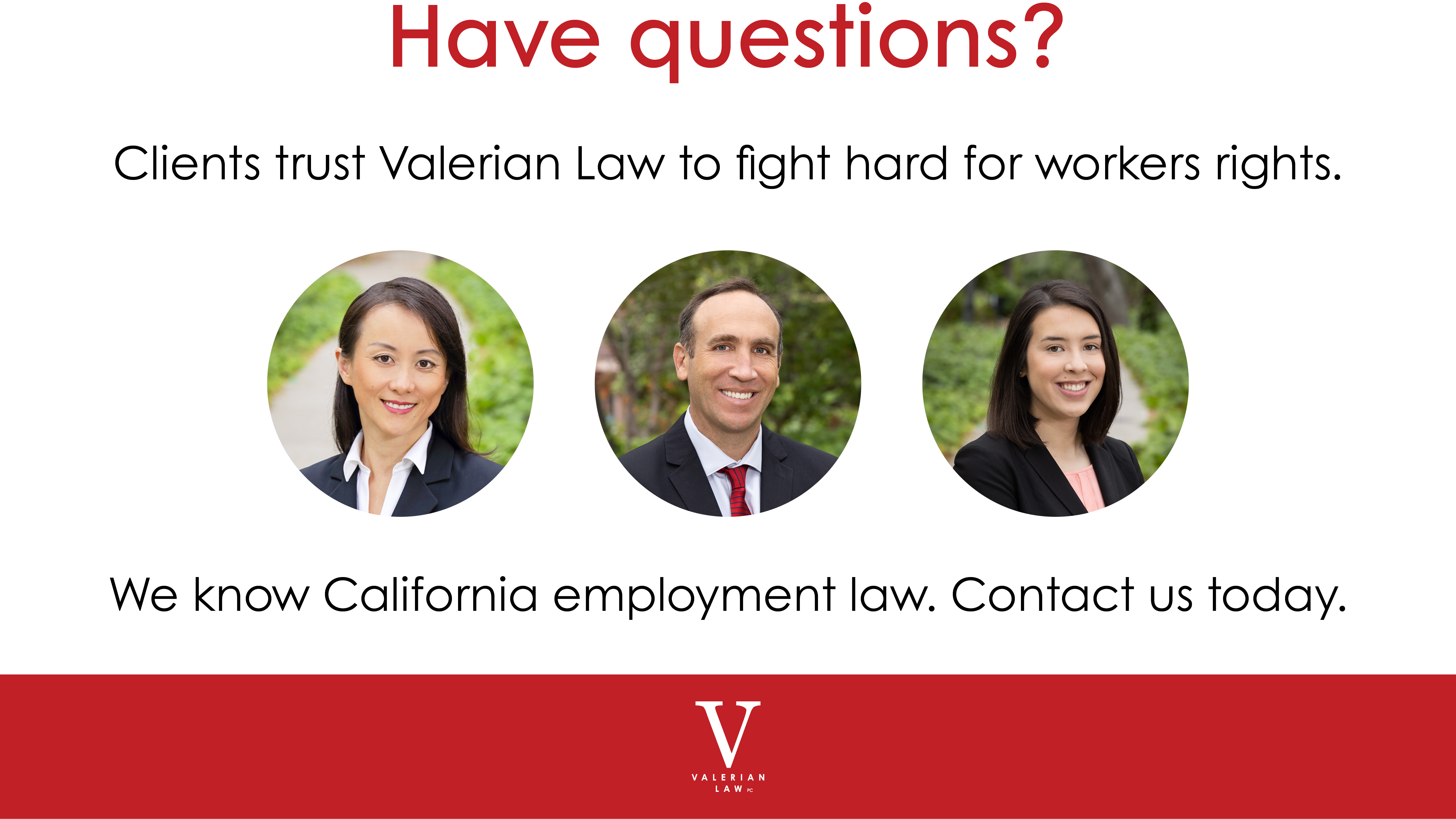
“I am a Human Resource generalist at a mid-sized private company. I told my department manager that we should not discourage employees from talking about pay, because that could be illegal. I learned this at a training hosted by our outside employment law firm about how HR should be handling compensation questions. My manager replied that she knew it was legally questionable but that the company’s longstanding practice was to counsel employees against talking about pay, at least while they were on company grounds.”
“I complained to Human Resources about being targeted for worse treatment than my coworkers, and indicated that I think it might be because I’m the only person over 40 on my team, and don’t have the same lifestyle as my younger coworkers. Does that make me a whistleblower?”
“I told my supervisor that my coworker’s boss was harassing my coworker with snide remarks about gay people, but my supervisor said he did not have the power to make it right. Am I a whistleblower?”
In California, the answer to those questions might very well be yes. We have previously written about California’s strong protections against workplace retaliation. It is worth repeating: California law protects an employee who blows the whistle internally – through expressing an objection to misconduct, lodging a hotline complaint, or going to someone who might have the ability to take action to correct the violation. And whistleblower protections apply regardless of the specific underlying illegality being objected to. It could be illegal conduct that the worker himself is suffering, such as discrimination, harassment, or wrongful denial of medical leave, or a wrong suffered by someone else or by no one – a victimless incident of noncompliance could also be the basis for whistleblowing, as today’s case study shows.
Today we’ll present a case study that shows how employees insisting on adherence to seemingly bureaucratic legal requirements are also conferred anti-retaliation protections. It is normal to worry that trying to do the right thing will have negative repercussions for our career. All of us have been in workplace situations where higher-ups have made a major mistake and point the finger at one another. We all know what it feels like when it is unclear who above us is really in charge of fixing a problem. And we all know the nagging feeling that we should speak up about something that seems illegal, even while suspecting it will do no good to be vocal.
That seems to be the frustrating situation that an environmental contractor found himself in, during a project for the military. After expressing concerns to his supervisors about the potential illegality of the work he was being ordered to engage in, he was fired from his job. The employee claimed that his actions were protected under the California Whistleblower Protection Act, and sued his employer for retaliation and wrongful termination. In October 2022, the Ninth Circuit federal appeals court ruled on this case against the employer firm and in favor of the employee-plaintiff, in a legal opinion that should further embolden employees.
The opinion in Killgore v. SpecPro Professional Services, LLC, 51 F.4th 973 (9th Cir. 2022) laid out the underlying facts as follows: An environmental services firm was hired by the United States Army Reserve Command to produce an environmental assessment of a proposal to convert twelve helicopter landing sites for the Army Reserve to use in helicopter assault training missions. The employee-plaintiff and his coworkers at this contractor firm came to believe that their higher-ups were directing them to produce an assessment of these sites that violated federal environmental laws. Plaintiff learned that the sites had already been used for Army Reserve helicopter exercises for a very long time, possibly since the 1990s. But SpecPro was unable to locate documentation including lease agreements authorizing the Army Reserve’s past usage. There had been no reports on the site’s environmental condition of property, endangered species report, soil sampling, cultural survey, and other evaluations typically required when assessing environmental impact. Despite these concerns, the plaintiff’s team was directed to produce a report within three months, and to omit mention of any issues involving prior use of the sites.
To be more specific, plaintiff and his teammates believed that it was a violation of federal law to omit mention of the prior military use of the sites. They believed it was illegal to hide the past history of the Army Reserve using the sites for helicopter training. In essence, the underlying wrong plaintiff opposed was nondisclosure of information and failure to follow the rules for analyzing environmental impact – violations without any clear impact on outcomes and no victims.
The plaintiff expressed concerns about the potential illegality of the directive to the Army Reserve’s project leader, Laura Caballero, and his own supervisor, Steve Emerson. He was subsequently fired. He then filed a lawsuit alleging retaliation in violation of the California Whistleblower Protection Act, Labor Code section 1102.5.
At the trial court level, the plaintiff initially lost, but at the appellate court level, the plaintiff obtained a reversal of the loss.
Initially, the trial court ruled against the plaintiff on three key points: First, that plaintiff’s disclosures to his supervisor were insufficient because Emerson was not “a person with authority over the employee or another employee who has the authority to investigate, discover, or correct the violation or noncompliance.” In the context of that case, Emerson was a person with authority over the Plaintiff, but as the civilian contractor he lacked the power to correct the Army Reserve’s alleged legal violations. Second, the trial court said Plaintiff’s disclosures to Army Reserve leader, Caballero, were not protected disclosures, since they were part of plaintiff’s “normal duties” of his employment and Caballero was a “wrongdoer” who already knew of the alleged violation. Third, the trial court ruled that plaintiff did not have reasonable cause to believe there was a violation of statute, rule, or regulation. Their reasoning was that the requested assessment was a “forward-looking” document to assess potential impacts, without the need to assess past actions.
On each issue, the federal Court of Appeals overturned the trial court. The appellate court held:
- It was enough that the plaintiff had expressed concerns to his supervisor, Emerson, and it did not matter that this supervisor did not have the power to correct the violation.
- It did not matter under the California Whistleblower Protection Act that expressing concerns about potential illegality was a part of the employee’s “normal duties” of employment.
- It was also a protected whistleblowing act to express concerns to the wrongdoer – the Army Reserve employee – even if the wrongdoer already knew the underlying facts.
- The Army Reserve employee worked for a government agency and disclosure to employees of government agencies are protected under California law.
- The federal environmental law did require environmental assessments to consider cumulative impacts, defined as including incremental effects added to effects of other past, present, and reasonably foreseeable actions. Therefore, the plaintiff did have reasonable cause to believe that his team was being asked to do something illegal.
On the first point, the appellate court stressed that the law protected a disclosure of a legal violation to either a supervisor or someone with authority to investigate or correct the violation. It was not required that the supervisor also have the authority to investigate or correct the violation. The court confirmed that the California Labor Code “section 1102.5(b) prohibits employers from retaliating against employees who disclose potential wrongdoing to any one of several enumerated avenues: government or law enforcement agencies, a person with authority over the employee, other employees with authority to investigate, discover, or correct the violation or noncompliance, or any public body conducting an investigation, hearing, or inquiry.” Killgore, 51 F.4th at 986 (emphasis added).
The appellate court stressed that there are separate and independent avenues for employees to disclose potential violations of law. It made clear that expressing concerns about a legal violation is protected whether the worker goes to:
- An employee of a government agency
- A person “with authority” over the whistleblower with the ability to act on that information, short of having authority to correct the violation.
- Other employees within an organization, such as an ombudsperson, human resources personnel, or a complaint hotline staff, who do not supervise the whistleblower yet may possess “authority to investigate, discover, or correct the violation.”
Killgore, 51 F.4th at 985.
These principles are applicable to many workplace conflicts. In this day and age, many employees play a role in following regulations that apply to their jobs. Many employees also are privy to sensitive information and encounter questions day-out about what information they are supposed to be disclosing, how and to whom.
Going back to the initial hypothetical, we should first note that federal and state laws do provide employees with the right to engage in discussions about compensation. Therefore, the HR employee who spoke up against their own department’s practice of discouraging lawful discussions about compensation is entitled to whistleblower protection. As Killgore teaches us, whistleblower protection applies even if it is her basic job duty to follow legal guidelines on this issue, even if her manager already knew that their department’s practice was illegal, and even if her manager was powerless to challenge their company’s long standing practice.
What if you went to HR to complain that you have been targeted for worse treatment on your team and that you suspected it was due to your age? This is probably also easily answerable. After all, HR is understood to have the authority to investigate discrimination complaints and age discrimination would violate employment law. Therefore, the internal complaint you are lodging would confer legal protection against retaliation pursuant to the California Whistleblower Protection Act, Labor Code section 1102.5.
What if you spoke up against misconduct as a bystander? Let’s say you told your manager that the supervisor of your friend at work, in the same company, was harassing your friend due to their sexual orientation. Your manager might feel that they are powerless to stop a peer manager from making inappropriate remarks. But regardless of their true authority or obligation to do something, you remain protected against retaliation for speaking up as an ally. You are a whistleblower even if you did not have the ideal avenues for channeling your objection and even if the manager said they are powerless to fix the problem. The findings in Killgore make it clear that you are also a whistleblower protected by California law.
Recent Posts
